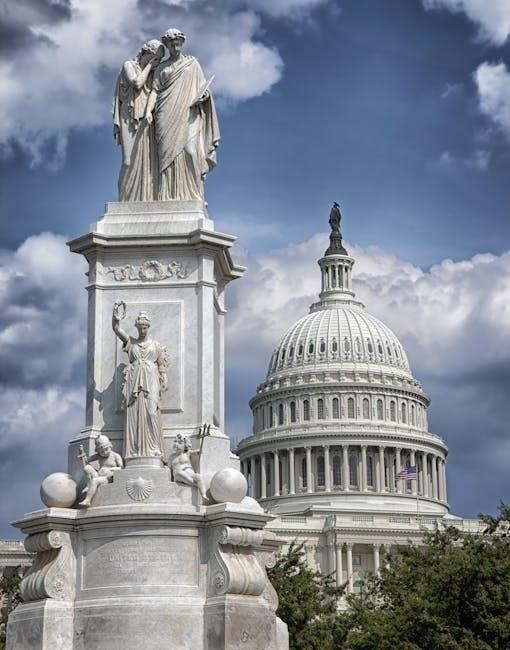Max Weber’s Politics as a Vocation is a seminal work exploring the nature of political engagement, leadership, and responsibility․ Available as a PDF, it remains a cornerstone of political theory, offering insights into the complexities of governance and the qualities required for effective political leadership․
Overview of the Concept
Max Weber’s Politics as a Vocation explores the essence of political engagement, defining politics as the leadership or influence within a state․ Available as a PDF, the essay examines the qualities and challenges of political life, emphasizing the importance of ethical judgment and responsibility․ Weber distinguishes between types of authority and discusses the skills required for effective governance․ The text remains a foundational resource for understanding political dynamics, offering insights into the complexities of power and leadership․ Its relevance endures, providing a framework for analyzing modern political systems and the roles of individuals within them․ Weber’s ideas continue to influence contemporary political theory and practice․
Historical Context of the Essay
Max Weber delivered Politics as a Vocation as a lecture in 1919, amid the turmoil following World War I․ The essay reflects the political instability of the time, particularly in Germany, as it transitioned from an empire to a republic․ Weber’s work was influenced by the societal upheaval, economic challenges, and the rise of new political ideologies․ The historical context underscores Weber’s concern with the role of leadership in navigating crises and the ethical dilemmas faced by politicians․ The essay, later published in 1946 by Oxford University Press, remains a vital analysis of political dynamics shaped by its historical backdrop․ Its insights continue to resonate with contemporary political challenges․
Max Weber: The Author and His Influence
Max Weber was a renowned German philosopher and sociologist whose work profoundly shaped modern political theory․ His essay Politics as a Vocation is a cornerstone of his legacy․
Weber’s ideas on leadership, bureaucracy, and the role of politics in society continue to influence contemporary governance and academic discourse, ensuring his enduring relevance in the field․
Biography of Max Weber

Max Weber, born in 1864 and passing in 1920, was a German philosopher, sociologist, and political economist․ His early life and academic career laid the foundation for his influential works․ Weber studied law, economics, and philosophy, becoming a prominent figure in German academia․ His intellectual journey led him to explore themes of bureaucracy, authority, and political leadership, culminating in works like Politics as a Vocation․ Weber’s experiences during World War I and its aftermath deeply influenced his views on governance and societal structures․ His legacy endures as a cornerstone of modern political theory, shaping discourse on leadership and state governance․
Weber’s Contribution to Political Theory
Max Weber’s essay Politics as a Vocation significantly shaped modern political theory by defining politics as the leadership and influence within a political association, particularly the state․ He introduced the concept of the “iron cage” of bureaucracy, highlighting its role in modern governance․ Weber also distinguished between types of authority—traditional, charismatic, and legal-rational—providing a framework for understanding political legitimacy․ His emphasis on the state’s monopoly on legitimate violence remains central to political analysis․ Weber’s work bridges sociology and political theory, offering insights into the dynamics of power, leadership, and the ethical challenges of political engagement, enduring as a foundational text in political studies․
Core Concepts in “Politics as a Vocation”
Max Weber’s essay defines politics as influencing state leadership, explores types of authority, and outlines essential qualities for politicians, emphasizing ethical responsibility and practical acumen․
The Definition of Politics
In Politics as a Vocation, Max Weber defines politics as the activity of influencing the leadership of a political association, particularly the state․ He emphasizes that politics involves the exercise of power to shape decisions that impact a community or society․ Weber’s definition centers on the idea that politics is not merely governance but also the struggle for control and influence within organizations․ This perspective underscores the role of authority, legitimacy, and conflict in political processes․ Weber’s approach remains foundational in understanding the complexities of political systems and the dynamics of power in modern societies․
Types of Political Leadership
In Politics as a Vocation, Max Weber identifies three primary types of political leadership: bureaucratic, charismatic, and traditional․ Bureaucratic leadership relies on administrative structures and legal authority, emphasizing efficiency and order․ Charismatic leadership, by contrast, is rooted in the personal qualities and vision of an individual, inspiring loyalty and devotion․ Traditional leadership is based on established customs and hereditary or cultural legitimacy․ Weber’s classification provides a framework for understanding how power is exercised and maintained in different political systems․ These categories remain influential in analyzing modern political dynamics and the evolving nature of leadership in various contexts․
Skills and Qualities of a Politician
Max Weber emphasizes that effective politicians must possess a unique combination of qualities, including passion, a sense of responsibility, and a clear perspective on their goals․ They must balance ethical convictions with political realism, adapting to the demands of power while maintaining integrity․ Weber highlights the importance of communication skills, strategic thinking, and the ability to inspire trust and loyalty․ A politician must also navigate the complexities of compromise and decision-making, often requiring emotional detachment to prioritize the greater good․ These qualities, as outlined in the PDF version of Politics as a Vocation, remain essential for successful political leadership in modern contexts․

Historical and Political Context of the Essay
The essay, published in 1946 by Oxford University Press, reflects the political turmoil of Weber’s time, post-WWI Germany, influencing his views on governance and leadership․
Time Period and Background
Politics as a Vocation was delivered as a lecture by Max Weber in 1919, during a period of political upheaval in Germany following World War I․ The country faced significant challenges, including the collapse of the monarchy, the rise of the Weimar Republic, and growing tensions between liberal, socialist, and nationalist movements․ This turbulent backdrop shaped Weber’s reflections on the role of politics and the qualities required for effective leadership․ The lecture, later published in 1946 by Oxford University Press, remains a critical analysis of political engagement and governance, offering timeless insights into the nature of state and society․
Influence of Historical Events on Weber’s Ideas
Max Weber’s Politics as a Vocation was profoundly influenced by the historical events of his time, particularly the aftermath of World War I and the collapse of the German Empire․ The rise of the Weimar Republic and the ensuing political instability shaped Weber’s views on leadership, authority, and the challenges of modern governance․ The turbulent interwar period, marked by social upheaval and the emergence of radical ideologies, further informed his reflections on the role of politicians and the ethical dimensions of political engagement․ These historical contexts are central to understanding Weber’s arguments about the nature of political authority and the qualities required for effective leadership in a rapidly changing world․

The PDF Version of “Politics as a Vocation”
The PDF version of Politics as a Vocation is widely available, published by Oxford University Press in 1946․ It can be downloaded for free or read online in various formats, including EPUB and Kindle, ensuring accessibility for modern readers․
Availability and Publications
Politics as a Vocation is widely available in PDF format, published by Oxford University Press in 1946․ It can be downloaded for free from platforms like Z-Library or purchased in EPUB and Kindle formats․ The essay has been translated into multiple languages, including a recent Mongolian edition, highlighting its global relevance․ Additionally, it is accessible through academic repositories such as the LSU Scholarly Repository․ This accessibility ensures that Weber’s insights remain widely read and studied, making it a foundational text in political theory and sociology․ Its availability in various formats caters to both scholars and general readers․
Key Features of the PDF Edition
The PDF edition of Politics as a Vocation offers a clear, digital format, preserving Weber’s original insights․ It includes the full text of the essay, ensuring accessibility for modern readers․ The PDF is compatible with various devices, making it convenient for academic and personal use․ Some versions include supplementary materials, such as introductions and commentaries, enhancing understanding․ The text is searchable and easily navigable, aiding research․ Its digital format ensures that Weber’s work remains relevant, reaching a global audience․ This edition is a valuable resource for students, scholars, and anyone interested in political theory and sociology․
Reception and Impact of the Essay
Politics as a Vocation has had a profound impact on political theory, shaping discussions on leadership and governance․ Its timeless relevance continues to influence modern discourse․
Initial Reception and Criticism
Upon its release, Politics as a Vocation sparked intense debate․ Many praised its depth and insight into political dynamics, hailing it as a cornerstone of political theory․ Critics, however, argued that Weber’s views were overly pessimistic, particularly regarding bureaucracy and authority․ Some found his emphasis on political realism and the separation of ethics from politics controversial․ Despite these criticisms, the essay’s influence grew, shaping discussions on governance and leadership․ Its availability in PDF format has ensured its reach, making it accessible for modern scholars and readers to engage with Weber’s provocative ideas․
Modern Relevance and Influence
Max Weber’s Politics as a Vocation remains highly relevant in contemporary political discourse․ Its exploration of leadership types and the challenges of governance continues to resonate, influencing modern political theory and practice․ The PDF version of the essay has facilitated its accessibility, making Weber’s ideas readily available to a global audience․ Scholars and policymakers draw on his concepts to analyze current political phenomena, such as the rise of populism and the complexities of bureaucratic systems․ Weber’s emphasis on ethical responsibility in politics also continues to inspire discussions on leadership and public service in the modern era․

Critical Analysis and Discussions
Scholars debate Weber’s ideas, praising his timeless insights but critiquing his limited cultural perspective and rigid bureaucracy views․
Strengths and Weaknesses of Weber’s Arguments
Max Weber’s Politics as a Vocation offers profound insights into political leadership and bureaucracy, emphasizing responsibility and ethical decision-making․ His analysis of political types—charismatic, traditional, and legal-rational—remains influential․ However, critics argue his focus on Western governance overlooks non-European contexts, limiting universality․ Additionally, Weber’s rigid distinction between bureaucracy and democracy is seen as overly simplistic, neglecting adaptive governance models․ Despite these flaws, his work provides a foundational framework for understanding political dynamics, blending sociological depth with practical wisdom, making it a cornerstone of political theory․
Contemporary Applications of the Essay
Max Weber’s Politics as a Vocation continues to resonate in modern political discourse, offering timeless insights into leadership and governance․ Its relevance is evident in discussions on bureaucratic inefficiencies and the challenges of balancing power with ethical responsibility․ The essay’s themes are particularly pertinent in analyzing contemporary issues such as the rise of populism, the role of charisma in leadership, and the tension between democracy and administrative structures․ Scholars and policymakers often draw on Weber’s ideas to understand current political phenomena, demonstrating the enduring legacy of his work in shaping modern political theory and practice․
